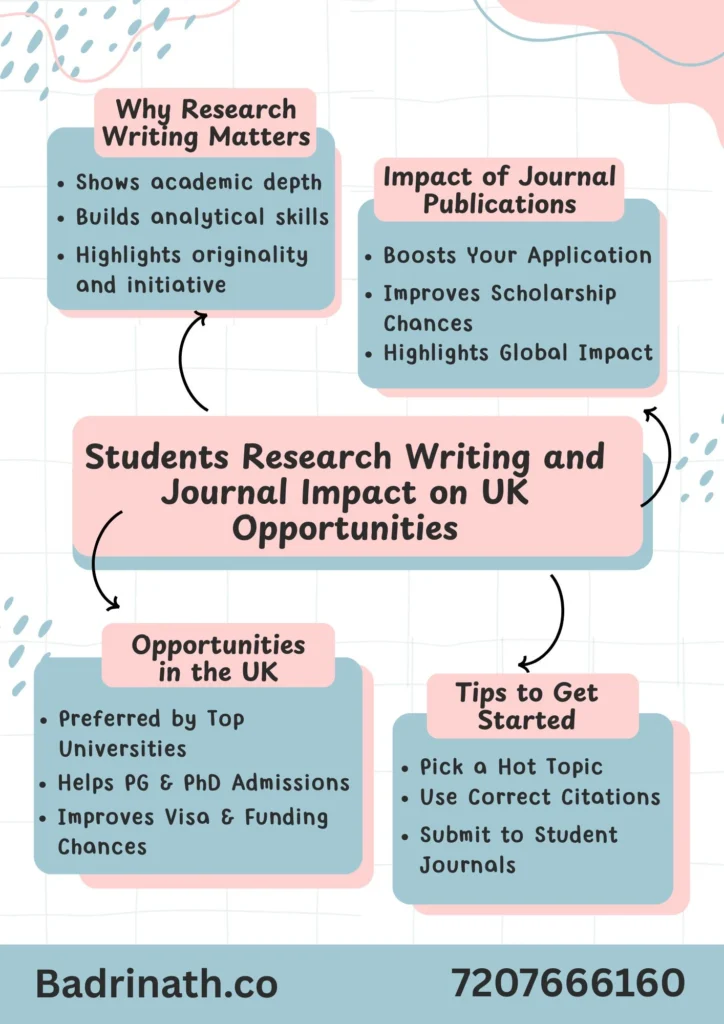Ever wondered why some students easily crack top UK universities or land amazing job offers in research-based roles? The secret sauce often lies in student research writing and getting published in impactful journals. Research writing isn’t just about putting words on paper. It’s about showing your intellect, problem-solving ability, and passion for a subject. And when this is published, especially in high-impact journals, it acts like a golden ticket to global academic and career opportunities, especially in the UK

The UK Academic and Professional Landscape
The UK is home to top-tier institutions that are hungry for research-minded individuals. Whether you’re aiming for Oxford, Cambridge, or a role in a pharma R&D lab in Manchester, one thing remains consistent: published research boosts your credibility.
Institutions often look at published work to:
- Assess your analytical skills
- Evaluate your potential to contribute to academic projects
- Understand your depth of subject knowledge
It’s not just universities. Employers in fields like data science, biotech, and consulting appreciate candidates who have published. It proves you’re proactive, detail-oriented, and a problem-solver.
What Is Students Research Writing?
Students research writing includes:
- Theses and dissertations
- Journal articles
- Conference presentations
- Project reports
It bridges classroom learning and real-world problem-solving. Academic research tends to be theoretical, while industry-oriented research focuses on practical application. Both have value—especially when published.
Journal Publications: Your Ticket to UK Academic Success
How Journal Impact Translates into Real UK Opportunities
Let’s talk facts: UK universities and employers love candidates with a publication background. Why? Because being published means you’ve got the goods. You’ve done the research, followed the process, and added something new to the conversation.
When you apply to a UK university, especially for research-heavy programs (like MSc, MRes, or PhD), having your name in a journal gives your application an edge. It’s a signal that you’re serious and capable of handling advanced academic tasks. This is especially true for globally ranked schools like Oxford, Cambridge, Imperial College London, and UCL.
It also plays a role in visa approvals and scholarship evaluations. Publications can boost your application for competitive programs like the Chevening Scholarship or even the Graduate Route Visa, where academic merit is a key factor.
UK Institutions That Value Student Publications
Several UK bodies look out for published talent:
- Research Excellence Framework (REF) uses publication output to assess academic quality.
- UKRI (UK Research and Innovation) often considers candidates with a published track record.
- Russell Group Universities (the UK’s Ivy League) love research-driven students.
So, if you’ve written and published—mention it everywhere: in your SOP, resume, interviews, and even in visa cover letters.
How Published Research Enhances Employability
Linking Academic Work to Real-World Career Growth
Your published research isn’t just for show—it has real career value. In the UK job market, especially in sectors like healthcare, engineering, data science, biotech, and policy-making, hiring managers often look for applicants who are already familiar with research protocols, ethical review processes, and advanced writing skills.
Having your research published means you’re not just academically smart but industry-ready. It demonstrates that you:
- Can investigate and solve complex problems
- Work independently with minimal supervision
- Communicate ideas clearly and professionally
In short, you’re not just employable—you’re valuable.
Industries in the UK That Value Research Backgrounds
Let’s get specific. Here’s where your research writing makes waves:
- Healthcare and Biomedicine: NHS and private health research labs
- Tech & Data Analytics: AI, machine learning startups
- Environmental Science: Renewable energy projects, policy research
- Education & Social Research: Public policy institutes, think tanks
- Pharmaceuticals: Companies like GSK, AstraZeneca, and biotech startups
If your research aligns with any of these sectors, you’ve got a head start. Even better if your paper was on a trending topic like climate change, AI in medicine, or data privacy.
Getting Started: Tools and Tips for Research Success
Practical Steps to Writing and Publishing Your Research
Getting published might seem intimidating, but trust me—it’s doable. Start with a topic you love. The more interested you are, the easier it’ll be to write with passion and clarity.
Here’s a step-by-step action plan:
- Select a relevant and original topic
- Build a strong thesis or research question
- Gather academic sources (use Google Scholar, JSTOR, etc.)
- Write a clear, structured draft
- Use tools like Grammarly, Turnitin, and Mendeley
- Ask a professor or mentor for feedback
- Submit to journals (preferably indexed and peer-reviewed)

Free and Paid Tools to Make Life Easier
- Grammarly: For grammar checks and tone improvements
- Turnitin: To avoid plagiarism issues
- Mendeley/Zotero: For citation management
- Google Scholar & Scopus: To explore existing research
- Overleaf: If you’re using LaTeX for scientific writing
Remember, your first paper doesn’t have to be perfect. Many successful researchers started with modest papers in student journals. What matters is getting started and staying consistent.
Conclusion
In today’s competitive academic and professional landscape, students need more than just good grades to stand out—they need a voice. Research writing and publishing provide that voice. For those eyeing the UK as their academic or career destination, published work is a golden ticket. It shows who you are, what you believe in, and what you’re capable of contributing to the world. Whether it’s a scholarship, a visa, or a job role, your research is a silent ambassador that speaks loudly in every room you’re not in.
External Links
British Educational Research Journal – Wiley Online Library
Teaching research writing in education: Practice and reflection






